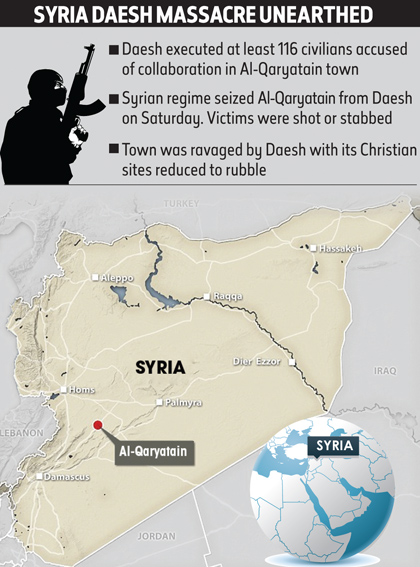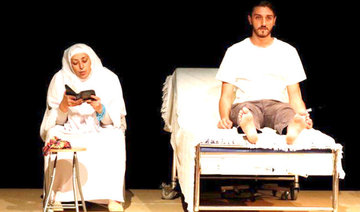BEIRUT: Daesh executed dozens of civilians this month in the Syrian desert, a monitor said Monday, in a gruesome massacre as the terrorists see their “caliphate” collapse.
The extremist group last week lost its key Syrian stronghold of Raqqa, the latest in a string of setbacks for the militants who are facing multiple offensives in both Syria and neighboring Iraq.
The Syrian Observatory for Human Rights, a Britain-based monitor, said Daesh fighters massacred more than 100 people in the desert town of Al-Qaryatain this month before they lost it to regime forces.
“IS (Daesh) has over a period of 20 days executed at least 116 civilians in reprisal killings, accusing them of collaboration with regime forces,” observatory chief Rami Abdel Rahman said.
Regime forces retook Al-Qaryatain, which lies in the central Homs province, on Saturday, three weeks after the terrorists seized control of it.
Daesh first occupied the town in 2015 and lost it to Russian-backed Syria forces last year.
“After the regime retook it (on Saturday), the town’s residents found the bodies on the streets. They had been shot dead or executed with knives,” Abdel Rahman said.
“Most of the IS fighters who attacked the town a month ago were sleeper cells ... They are from the town, know the town’s residents and who is for or against the regime,” he said.
The majority of those killed were executed in the last two days before Daesh lost the town again, he added.
The regime seized back Al-Qaryatain on Saturday after more than 200 terrorists withdrew from the town overnight, pulling back into the vast desert region that stretches all the way to the Iraqi border.

Al-Qaryatain was a symbol of religious coexistence before the civil war broke out in 2011, with some 900 Christians among its population of 30,000. But it was ravaged by Daesh during the group’s eight-month-long occupation of the town in 2015-16, with its Christian sites including a fifth-century church reduced to rubble.
At the peak of its power in 2014, Daesh’s self-styled “caliphate” in Syria and Iraq was approximately the size of Britain.
But it has suffered a string of major setbacks in recent months, including the loss in July of its most important Iraqi stronghold, the city of Mosul.
Last week, it also lost its most important Syrian bastion, the city of Raqqa, after a campaign of more than four months led by the Kurdish-Arab Syrian Democratic Forces (SDF), a US-backed militia.
The terror group is now mostly confined to the oil-rich province of Deir Ezzor in the country’s east, along the border with Iraq.
Daesh holds around 40 percent of the province, which was once almost completely in its hands, and faces two separate offensives, including by the SDF.
The US-backed militia is fighting the group mostly on the eastern side of the Euphrates River that slices diagonally across the province.
On Sunday, SDF fighters seized one of the country’s largest oilfields from the group.
Syria’s regime is conducting a separate, Russian-backed offensive in the province, largely on the western bank of the river.
In September, the offensive ended a Daesh siege of nearly three years on regime-held parts of the provincial capital Deir Ezzor city.
The group now holds just eight percent of the city, according to the observatory.
Elsewhere in the country, Daesh holds just a few pockets of territory, including a handful of recently recaptured villages in central Hama province, and parts of the Palestinian Yarmuk camp in southern Damascus.
An allied group, Jaish Khaled Bin Walid, is also present in parts of southern Syria.














